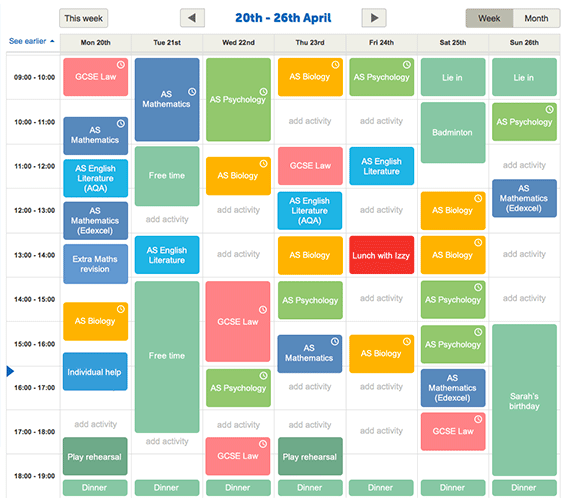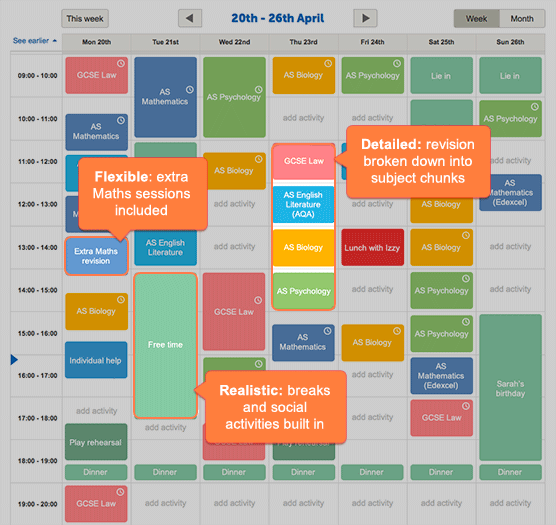Create a revision timetable
Make studying manageable. Build a plan around your life. Get confident for your exams.

Organise your revision time
Balancing studying with the fun stuff in life can be difficult. Revising can get in the way of everything from meeting friends to relaxing after school.
Building a revision plan helps you manage your time more effectively. It gives you a clear idea of what subjects and topics you’ll be revising each day and helps you organise your studies around your life.
The Study Planner:
- Builds revision sessions around your life
- Automatically adds revision sessions for you
- Reminders of revision sessions
Why build a revision timetable?
Revision shouldn’t be left to chance - your exams are just too important. By not planning you can run out of time, miss vital information and find it all a bit too much.
A revision timetable helps you avoid all of this. 15 minutes of planning will help you be more productive, keep you motivated and will boost your confidence for the challenge ahead.
The Study Planner:
- Creates a detailed plan for you in 15 minutes
Gives you reminders to keep you to plan Lets you adjust your revision time for each exam

What makes a good revision plan?
A good revision plan should be:
Realistic: everyone has good intentions, but be careful not to set a plan you can’t stick to. Nobody can do 12 hours of revision a day.
Detailed: a good plan breaks revision into chunks, specifies times for studying and assigns each time to a subject or topic.
Flexible: some topics are difficult and may take you longer than you planned. Don’t be afraid to adjust your plan accordingly.
The Study Planner:
- Automatically schedules revision around your life
Breaks your revision into manageable chunks Easy to change and update
How to create your revision timetable
Get all the information y ou need - this includes your exam dates, lesson timetable, shifts at work and when you’re meeting your friends. Block out the times you can’t study - be realistic, if you’re not going to work before 10am on a Sunday block that time out. Pick a revision start date - pin down a day to get started and think about your revision priorities. Some subjects and topics will take longer than others. Plot your revision sessions - decide how much time you’re going to spend on each topic and schedule in breaks. Display your plan - a plan is no good if you don’t check it. Print it out and put in on your wall so that you can remind yourself what you’re studying and when.
The Study Planner:
- Easy to block out times when you can’t study
Has colour options to help visualise your plan Printable so that you can stick it on your wall
Using your revision timetable to stay motivated
Sticking to a revision plan is hard. Try sharing your plan with friends and family so they can keep you on track and make sure your plan stays accurate by updating it when things change.
Ticking off topics when you’ve covered them will give you a sense of achievement and revision will be more interesting if you vary the way you revise. Try making your own flashcards and mind maps, get together with friends and test each other and don’t forget to practise past questions.
The Study Planner:
- Sends email reminders to keep you motivated
Helps break your subjects down into key topics Easy to update using drag and drop functionality

